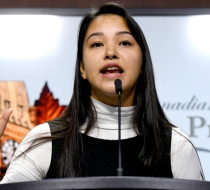#NoFutureNoChildren Favorite
As leaders across the world are getting ready to gather together to discuss climate change—and what to do about it—at the UN Climate Change Summit in New York next week, hundreds of young people across the world are going on birth strike to pressure policymakers into action.
At the time of writing, close to 1,000 people have pledged to not have children until their government can ensure a safe future for them. The #NoFutureNoChildren movement was launched Monday, Vice reports, by Emma Lim, an 19-year-old from London Ontario in Canada. On the website, she recalls reading a report published by the International Panel on Climate Change (IPCC) in 2018, which warned of the severe dangers of not limiting global warming to 1.5 degrees Celsius above pre-industrial levels—and feeling terrified.
Lim says she has seen climate change in her own backyard, from annual occurrences of once-in-a-century floods to summer heatwaves—and the simple fact that in winter they can not skate on the pond anymore. The effects of climate change are only expected to get worse with scientists prophesying ecosystem decline, fresh water shortages and (more) dirty air if we don't clean up our act.
"I am giving up my chance of having a family because I will only have children if I know I can keep them safe. It breaks my heart," she writes. "I created this pledge because I know I am not alone."
Many others have chimed in with their own stories—and their own reasons for not having kids, if governments fail to act. Michelle Xie from Vancouver, British Columbia, for example, mentions wildfires and the surge of air pollution that results, causing asthma and other respiratory complications to develop in children.
Jacob Bildy from London Ontario references a 2018 stat from the World Bank that estimates more than 140 million people will migrate as a result of climate change. He says he worries about the effects of mass immigration above the scale seen in 2015, which catapulted far-right parties across Europe into the mainstream and, in some cases, to positions of political power.
The UN future in-country and cross-country migration forecast varies from 25 million to upper limit of 1 billion environmental migrants by the mid-century. In comparison, the 2015 migrations from Syria to Europe that Bildy talks about involved just 1 million refugees. As of June 2019, that number has increased to 6.7 million.
Alexandra Peterson, also from London Ontario, simply writes: "Why should future generations have to go through the mess our own government and people created?"
This pledge is just one facet of a movement dedicated to giving up the opportunity to start a family on environmental grounds that has been picking up steam over recent years.
The numbers show that U.S. birth rates are dropping steadily—falling again in 2018, for the fourth time in a row, to a 32-year record low. Declining fertility rates, delays of life's milestones—if completing them at all—and economic challenges all part of the explanation.
But so is climate uncertainty. A Business Insider poll conducted in March found that almost 30 percent of U.S. respondents strongly agree, agree or somewhat agree that potential parents should consider the negative and potentially life-threatening impacts of climate change when they consider having children. The figure was even higher among millennials—close to 38 percent of those aged 18 and 29 and 24 percent of those aged 30 and 44 agreed.
In addition to the health and socioeconomic problems climate change could reap on future children, many point out the cold, hard fact that having a baby will pump out more greenhouse gasses and further exacerbate the climate problem.
In one study from 2009, individuals in the developed world can increase their carbon footprint by six with every child—each new person in the U.S. contributes around an extra 9,441 metric tons of CO2. A study in 2017 found that having one fewer child was the most effective way people could slash their carbon emission. The next-best involved selling your car, eschewing long haul and going veggie.
Lim's #NoFutureNoChildren is not the first group centered on the idea of a birth strike to save the planet and prevent future citizens from having to deal with the climate catastrophe.
BirthStrike in the U.K. and U.S. are two examples. But Lim's hashtag, and the hundreds of young people who have signed up to the pledge in just the few days, highlights the central role younger generations are playing in the climate debate—thousands of whom are expected to walk out of school this Friday as part of the youth climate strike led by teen activist Greta Thunberg.
Miccall, Rosie. "F#NOFUTURENOCHILDREN: HUNDREDS OF YOUNG PEOPLE ARE PLEDGING NOT TO HAVE CHILDREN FOR THE ENVIRONMENT." Newsweek, 19 September 2019, www.newsweek.com/hundreds-people-pledge-no-children-climate-change-1460140.







